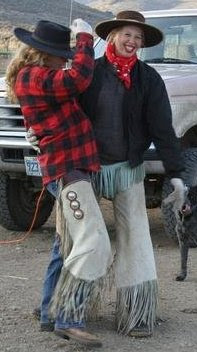Today we're sharing the story of Sam & Jess Hedges, a cowboy-ing couple from the Great Basin!
We're Sam & Jessica Hedges, from the beautiful, vast and wild area of the Great Basin known as SE Oregon, south of Burns, OR to be specific.
We both grew up on ranches. Sam in Nevada, Utah, Wyoming, and Montana. Jess in California and Nevada. Since getting married, we have ventured into Washington and Oregon. We both had a short stint in Elko, Nevada where we met while we were going to college, but quickly figured out that our lives were about cowboying and that's how we wanted to raise our someday family.
We are both driven by the history, the tradition, the horsemanship, the sense of family that surrounds ranching. Its hard work, but it is honest and heartfelt.
Our favorite thing about living on a ranch is the freedom.
"There is nothing like the feeling that you get down deep in side when you trot out in the morning and you're hired on to ride."~ Waddie Mitchell
Jess use to ride on a daily basis when the couple lived in cow camp, but has recently hung up her spurs to be a full time mom to their 7 month old son, Quirt.
Outside of the normal day to day, Sam makes knives and braids rawhide. Jess is a nationally acclaimed cowboy poet and has started her own accessories line, The Buckarette Collection.
A typical day for us is non-existent. You can walk out the door that day with a plan and have it all change. Sam can be on a horse, welding, putting out mineral, or any other number of things in a day. Jess can be on the road performing, running errands in town, training a dog or horse, or creating an original Buckarette Collection piece.
Jess gets to deal with a lot misconceptions and misunderstanding about cowboy life through her experiences as a cowboy poet.
Jess gets to deal with a lot misconceptions and misunderstanding about cowboy life through her experiences as a cowboy poet.
I (Jess) was talking to a group of grade schoolers in Durango, CO and you could hear them gasp as I explained that we only went town once a month. Walmart was 5 hours and was a once every couple of months trip.
Although we are no longer in cow camp, we had in the past lived 4 hours from town and had no cell service, no tv, there were times of the year that you couldn't get in or out. The idea that people are happy without technology and do this all for the sake of producing the nation's beef is unheard of. The remoteness and the lifestyle it takes to have a cheeseburger available when you hit the McDonald's drive thru is one of the biggest misconceptions.
You can learn more about Jess Hedges and her story by visiting her poetry website, her poetry Facebook page, and her Facebook page for the Buckarette Collection. She also has a personal Twitter account, and a Buckarette Collection twitter, as well as an Instagram.
If you or someone you know is interested in sharing your story or agricultural experience, please contact us today! We are always looking for more features - YOU could be the next Face of Agriculture!


























